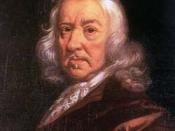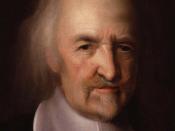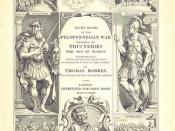1
"Life of Thomas Hobbes"
Joe Rovelli
Political Sociology
Professor Abrams
Fall "06"
1
Thomas Hobbes was born in London in 1588. He received his college education at Oxford University in England, where he studied classics. The contributions he has made to philosophy is remarkable to say the least. Hobbes became interested and spent a great deal of his life trying to figure out why people allowed themselves to be ruled and what would be the best form of government for England. In 1661, Hobbes wrote his most famous work, entitled Leviathan. In his piece, he stated, "For the laws of nature (as justice, equity, modesty, mercy, and, in sum, doing to others as we would be done to) of themselves, without the terror of some power, to cause them to be observed, are contrary to our natural passions, that carry us to partiality, pride, revenge and the like."
He argued that people were naturally evil and could not be trusted to govern. Therefore, Hobbes concluded that an absolute monarchy was best for society.
2
Throughout his life, Thomas Hobbes faced several issues. One issue he faced was the controversy among Bishop John Bramhall. After completing De Corpore in 1654, a small treatise, Of Liberty and Necessity was published by Bramhall addressed at Hobbes. Bramhall had met and debated with Hobbes and afterwards wrote down his views and sent them privately to be answered in this form by Hobbes. (Wikipedia, 1) Hobbes replied, but not for publication, but a French acquaintance took a copy of the reply and published it with "an extravagantly laudatory epistle." Bramhall countered in 1655, when he printed everything that had passed between them. In 1656, Hobbes was ready with his Questions concerning Liberty, Necessity and Chance, in which he replied, "with...


